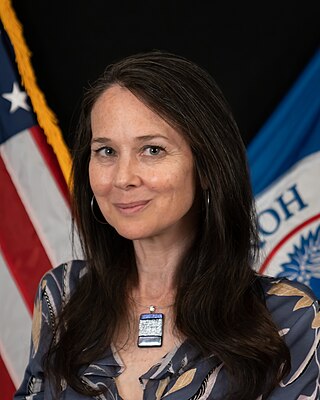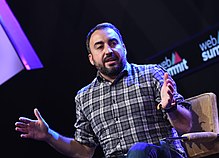ATstake, Inc. was a computer security professional services company in Cambridge, Massachusetts, United States. It was founded in 1999 by Battery Ventures and Ted Julian. Its initial core team of technologists included Dan Geer and the east coast security team from Cambridge Technology Partners.
Brian Krebs is an American journalist and investigative reporter. He is best known for his coverage of profit-seeking cybercriminals. Krebs is the author of a daily blog, KrebsOnSecurity.com, covering computer security and cybercrime. From 1995 to 2009, Krebs was a reporter for The Washington Post and covered tech policy, privacy and computer security as well as authoring the Security Fix blog.
A supply chain attack is a cyber-attack that seeks to damage an organization by targeting less secure elements in the supply chain. A supply chain attack can occur in any industry, from the financial sector, oil industry, to a government sector. A supply chain attack can happen in software or hardware. Cybercriminals typically tamper with the manufacturing or distribution of a product by installing malware or hardware-based spying components. Symantec's 2019 Internet Security Threat Report states that supply chain attacks increased by 78 percent in 2018.
SolarWinds Corporation is an American company that develops software for businesses to help manage their networks, systems, and information technology infrastructure. It is headquartered in Austin, Texas, with sales and product development offices in a number of locations in the United States and several other countries. The company was publicly traded from May 2009 until the end of 2015, and again from October 2018. It has also acquired a number of other companies, some of which it still operates under their original names, including Pingdom, Papertrail and Loggly. It had about 300,000 customers as of December 2020, including nearly all Fortune 500 companies and numerous agencies of the US federal government.
Trellix is a privately held cybersecurity company that was founded in 2022. It has been involved in the detection and prevention of major cybersecurity attacks. It provides hardware, software, and services to investigate cybersecurity attacks, protect against malicious software, and analyze IT security risks.
Trustwave is an American cybersecurity subsidiary of The Chertoff Group. It focuses on providing managed detection and response (MDR), managed security services (MSS), database security, and email security to organizations around the globe.
Mandiant is an American cybersecurity firm and a subsidiary of Google. It rose to prominence in February 2013 when it released a report directly implicating China in cyber espionage. In December 2013, Mandiant was acquired by FireEye for $1 billion, who eventually sold the FireEye product line, name, and its employees to Symphony Technology Group for $1.2 billion in June 2021.
A bug bounty program is a deal offered by many websites, organizations, and software developers by which individuals can receive recognition and compensation for reporting bugs, especially those pertaining to security exploits and vulnerabilities.
Cozy Bear, classified by the United States federal government as advanced persistent threat APT29, is a Russian hacker group believed to be associated with one or more intelligence agencies of Russia. The Dutch General Intelligence and Security Service (AIVD) deduced from security camera footage that it is led by the Russian Foreign Intelligence Service (SVR), a view shared by the United States. Cybersecurity firm CrowdStrike also previously suggested that it may be associated with either the Russian Federal Security Service (FSB) or SVR. The group has been given various nicknames by other cybersecurity firms, including CozyCar, CozyDuke, Dark Halo, The Dukes, Midnight Blizzard, NOBELIUM, Office Monkeys, StellarParticle, UNC2452, and YTTRIUM.
The Internet service company Yahoo! was subjected to the largest data breach on record. Two major data breaches of user account data to hackers were revealed during the later half of 2016. The first announced breach, reported in September 2016, had occurred sometime in late 2014, and affected over 500 million Yahoo! user accounts. A separate data breach, occurring earlier around August 2013, was reported in December 2016. Initially believed to have affected over 1 billion user accounts, Yahoo! later affirmed in October 2017 that all 3 billion of its user accounts were impacted. Both breaches are considered the largest discovered in the history of the Internet. Specific details of material taken include names, email addresses, telephone numbers, encrypted or unencrypted security questions and answers, dates of birth, and hashed passwords. Further, Yahoo! reported that the late 2014 breach likely used manufactured web cookies to falsify login credentials, allowing hackers to gain access to any account without a password.
Election cybersecurity or election security refers to the protection of elections and voting infrastructure from cyberattack or cyber threat – including the tampering with or infiltration of voting machines and equipment, election office networks and practices, and voter registration databases.

The Cybersecurity and Infrastructure Security Agency (CISA) is a component of the United States Department of Homeland Security (DHS) responsible for cybersecurity and infrastructure protection across all levels of government, coordinating cybersecurity programs with U.S. states, and improving the government's cybersecurity protections against private and nation-state hackers.

Russian interference in the 2020 United States elections was a matter of concern at the highest level of national security within the United States government, in addition to the computer and social media industries. In 2020, the RAND Corporation was one of the first to release research describing Russia's playbook for interfering in U.S. elections, developed machine-learning tools to detect the interference, and tested strategies to counter Russian interference. In February and August 2020, United States Intelligence Community (USIC) experts warned members of Congress that Russia was interfering in the 2020 presidential election in then-President Donald Trump's favor. USIC analysis released by the Office of the Director of National Intelligence (DNI) in March 2021 found that proxies of Russian intelligence promoted and laundered misleading or unsubstantiated narratives about Joe Biden "to US media organizations, US officials, and prominent US individuals, including some close to former President Trump and his administration." The New York Times reported in May 2021 that federal investigators in Brooklyn began a criminal investigation late in the Trump administration into possible efforts by several current and former Ukrainian officials to spread unsubstantiated allegations about corruption by Joe Biden, including whether they had used Trump personal attorney Rudy Giuliani as a channel.
Chris Kubecka is an American computer security researcher and cyberwarfare specialist. In 2012, Kubecka was responsible for getting the Saudi Aramco network back up and running after it was hit by one of the world's most devastating Shamoon cyberattacks. Kubecka also helped halt a second wave of July 2009 cyberattacks against South Korea. Kubecka has worked for the US Air Force as a Loadmaster, the United States Space Command and is now CEO of HypaSec, a security firm she founded in 2015. She lives and works in the Netherlands.

Christopher Cox Krebs is an American attorney who served as Director of the Cybersecurity and Infrastructure Security Agency in the United States Department of Homeland Security from November 2018 until November 17, 2020, when President Donald Trump fired Krebs for contradicting Trump's claims of election fraud in the 2020 presidential election.
Jack Cable is an American computer security researcher and software developer. He is best known for his participation in bug bounty programs, including placing first in the U.S. Department of Defense's Hack the Air Force challenge. Cable began working for the Pentagon's Defense Digital Service in the summer of 2018.
SentinelOne, Inc. is an American cybersecurity company listed on NYSE based in Mountain View, California. The company was founded in 2013 by Tomer Weingarten, Almog Cohen and Ehud ("Udi") Shamir. Weingarten acts as the company's CEO. Vats Srivatsan is the company's COO. The company has approximately 2,100 employees and offices in Mountain View, Boston, Tokyo, and Berlin. The company uses machine learning for monitoring personal computers, IoT devices, and cloud workloads. The company's platform utilizes a heuristic model, specifically its patented behavioral AI. The company is AV-TEST certified.

In 2020, a major cyberattack suspected to have been committed by a group backed by the Russian government penetrated thousands of organizations globally including multiple parts of the United States federal government, leading to a series of data breaches. The cyberattack and data breach were reported to be among the worst cyber-espionage incidents ever suffered by the U.S., due to the sensitivity and high profile of the targets and the long duration in which the hackers had access. Within days of its discovery, at least 200 organizations around the world had been reported to be affected by the attack, and some of these may also have suffered data breaches. Affected organizations worldwide included NATO, the U.K. government, the European Parliament, Microsoft and others.

Jen Easterly is an American intelligence and former military official who is serving as the director of the Cybersecurity and Infrastructure Security Agency in the Biden administration. She was confirmed by a voice vote in the Senate on July 12, 2021.






